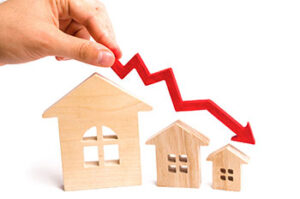
With the coronavirus pandemic affecting virtually all businesses and individuals across the country, you’re likely wondering what that means for you, your investment properties, and the future of the real estate market.
While it may be difficult to predict exactly what’s going to happen, issues related to COVID-19 may be leading to market shifts we’ve seen in the past, and there might be an opportunity for you to expand your investment portfolio. Let’s dive in and see what the market is telling us.
Table Of Contents For COVID-19, The Rental Market, & Investment
- What Exactly Is Changing In The Market?
- What Does This Mean For Landlords?
- How Should I Prepare For The Potential Opportunity?
- Should I Invest In More Properties?
What Exactly Is Changing In The Market?

While the peaks and valleys of the real estate market are ever-changing and largely unpredictable, one thing that will likely happen as a result of the pandemic is shaken confidence in the market.
As millions of people watch stock prices, businesses, and the economy as a whole shift unpredictably, more and more people will likely be wary of how the real estate market will look on the other side of the pandemic. Although risk in real estate may be lower than with other investment opportunities over time, high property prices often mean people will act more carefully with their money.
While buyers may not directly change how they purchase properties in times of uncertainty, lenders very often make changes in how they lend to protect themselves against the possibility of a decline in the market. They may raise their credit qualifications, limit loans to value ratios, or employ a variety of other changes that serve to protect against market volatility.
In the past, tightened lending practices have led to decreased buying power: as lenders get more strict with how they lend and with properties they’re willing to accept as collateral, fewer people will have the ability to purchase properties. In a nutshell, less buying power means fewer people buying properties.
What Does This Mean For Landlords?
For landlords in any market, more people being approved for loans means fewer renters, and the inverse is true as well. The beauty of real estate is that everyone needs a place to live whether they own or rent, so when fewer people have the opportunity to buy, more people will be forced to rent. Generally, the percentage of renters is highest when buying power and ability is lowest.
We’re sure you can already see the potential silver lining here: if lending practices do tighten up a bit, it’s likely that more people will be looking for properties or units to rent.
How Should I Prepare For The Potential Opportunity?

An increased number of renters might mean that a vacant unit you have could be filled more easily in the coming months with more people looking to rent. To start, any vacant rentals you might have available should be kept in rent-ready condition so you can fill the space as soon as the opportunity arises.
Additionally, if the percentage of people renting does increase, you could be looking at several candidates for each rental property you have, which might provide you with the opportunity to choose who gets moved into your rental. This means you should be prepared to review candidates properly and efficiently to sign a lease with the safest and most qualified renter.
This is a luxury that isn’t always afforded to landlords, so be prepared to take advantage of it if it does come to fruition. Having the ability to choose carefully between a handful of interested renters could make the difference between getting rent on time every month and not getting it at all. With renter options, you have the luxury of choosing the safest option.
Should I Invest In More Properties?
With all of this information and potential opportunity, you may be asking if increasing your investment portfolio is a good idea at this time. Since the general trend of real estate over time is upward, the short answer is, “real estate investment is usually a good idea,” but things are a little more complicated than that.
If these changes in market confidence do lead to lenders altering their criteria for lending and, consequently, an increased number of renters, chances are that borrowing money to purchase properties will be harder for everyone, not just end-users.
With that in mind, if you’re able to purchase in cash, it might be a good time to invest in additional units. If renters do become more prevalent in the market, there’s a good chance those units won’t sit vacant for too long. If you’re financing additional investment properties, just know that your buying power may be more limited as well.
Of course, we’d be remiss if we didn’t warn again that these potential market changes are only speculative and based on what has happened in the past; remember that nothing can be guaranteed. However, if you have been thinking recently about bolstering your portfolio, now may be an ideal time to start doing that, as you may see an increased number of applicants looking to rent your units.
In Summary
Uncertainty in real estate is nothing new, and we’ve seen many times in the past how shaken confidence in the future of the real estate market can lead to great opportunities for landlords. Consider how the changes will affect your area and pool of prospective renters, and if you’ve been looking to expand your portfolio, know that now may be a good time to do so.
You can position yourself properly by getting your units rent-ready and by preparing to screen renters properly to find the best and safest renter for your space.

